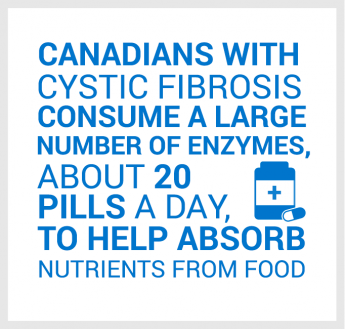Dr. Anne Stephenson is a respirologist and clinician at St. Michael’s Hospital as well as director of the Canadian Cystic Fibrosis Registry. Dr. Stephenson was recently funded by Cystic Fibrosis Canada for her study Getting older and wiser: the complexities of ageing with cystic fibrosis. Her study has received both the Cathleen Morrison Research Impact Award for being the highest-ranked project among our community reviewers, as well as the Robbie Award for Most Promising New Research Project. Learn more about Dr. Stephenson’s research and impact on the CF Community below.
How did you become involved in cystic fibrosis research and what do you enjoy most about your work?
I absolutely love my work as a cystic fibrosis physician and researcher for several reasons, and one of the most compelling is the profound sense of connection it provides. Being able to establish deep, empathetic relationships with my patients and their families is incredibly rewarding. Cystic fibrosis is a complex and challenging condition, and by working closely with my patients, I not only help them manage their illness but also get to know some of the most inspiring individuals. Witnessing their resilience, determination, and unwavering spirit in the face of adversity is both humbling and motivating. Every day, I am reminded of the incredible strength of the human spirit, and it fuels my passion for this field. The opportunity to make a positive difference in the lives of those I care for is a privilege that I cherish, and it's what makes me truly love my work as a cystic fibrosis physician and researcher.
You have been funded by CF Canada before. Would you like to speak about your past funded work? How valuable has the support from CF Canada been for you and your research?
My past research, generously funded by Cystic Fibrosis Canada, has focused on a crucial aspect of understanding and addressing cystic fibrosis (CF), specifically, international differences in health outcomes among individuals living with this disease. By conducting comprehensive analyses, my team and I have highlighted disparities and gaps in CF care and outcomes across various regions and healthcare systems. This research has provided invaluable insights into the multifaceted challenges faced by CF patients globally, including disparities in access to specialized care, variations in treatment approaches, and differing socio-economic influences on health outcomes. Such findings have not only raised awareness about the need for more equitable CF care but have also laid the foundation for developing targeted strategies to correct these deficiencies. Through the support of Cystic Fibrosis Canada, we have made significant strides toward improving the lives of CF patients worldwide by promoting evidence-based interventions and policies that aim to bridge these international disparities and ultimately enhance the quality of care and life for individuals with CF.
Can you explain why aging with cystic fibrosis is such a critical area of research that needed to be addressed and how it will make a difference for those living with cystic fibrosis?
Research focused on aging in cystic fibrosis is of paramount importance to gain a comprehensive understanding of the evolving needs of individuals living with this disease. Cystic fibrosis is no longer solely a pediatric condition, as advancements in treatments and care have led to a significant increase in the median age of survival, now exceeding 57 years in Canada. As people with CF are living longer, they may encounter a host of health challenges that were not previously recognized within this population, such as cardiovascular diseases, kidney diseases, and metabolic disorders. Additionally, proactive screening for malignancies is essential to ensure early diagnosis and effective management. By delving into the unique healthcare demands and complexities faced by individuals aging with CF, we can tailor care strategies, treatment regimens, and screening protocols to address their specific needs, ultimately improving their quality of life and well-being well into adulthood. This research not only benefits the CF community but also contributes to the broader understanding of aging-related health issues in a unique context, offering valuable insights for healthcare systems and practitioners.
You have been a valuable member of the CF Canada community, being medical director of the Canadian CF registry and adult CF clinician. Can you briefly explain your inspiration to become so involved with cystic fibrosis and what keeps you motivated to go further?
Back in 2008, I had the good fortune to become involved with Cystic Fibrosis Canada. What impressed me was the CF community's foresight in recognizing the critical importance of collecting data within the Canadian CF Registry, which has been in existence since the 1970s, to gain insights into the population's health and needs. I was fortunate to have the opportunity to learn and contribute under the mentorship of Dr. Mary Corey, who oversaw the Canadian CF registry and who was my PhD supervisor, and I wanted to be part of the registry team at CF Canada. The Canadian CF Registry, as a comprehensive data source, has proven to be an invaluable resource, offering an understanding of where we have been and where we are headed in the fight against CF. It is remarkable that virtually the entire CF population participates in this effort. These data have been harnessed for educational purposes, advocacy (most recently to provide data for the impact of Trikafta in Canada), research, and fundraising, contributing significantly to our collective progress. Moreover, the registry has continuously evolved to better serve the community's needs, thanks to the dedicated support from Cystic Fibrosis Canada.
Congratulations on receiving the Cathleen Morrison Research Impact Award, meaning your research was ranked the highest among our community reviewers. How is this award significant to you and your work?
Receiving the Cathleen Morrison Research Impact Award holds immense significance for me on both a personal and professional level. When I embarked on my journey in the field of cystic fibrosis (CF), Cathleen Morrison was the CEO of Cystic Fibrosis Canada, and her unwavering passion for CF care left a lasting impression on me. To learn that members of the CF community nominated my research for this prestigious award is incredibly touching and deeply meaningful. It reaffirms my commitment to conducting research that is not only scientifically rigorous but also directly impactful on the lives of those living with CF. I am driven by a desire to contribute meaningful insights that can improve the quality of life for individuals with CF. This award serves as a powerful reminder that I am on the right path, working towards a shared goal of making a positive difference within the CF community. It inspires me to continue my dedicated research efforts and further align my work with the needs and aspirations of those affected by this condition.
You also received the Robbie Award for Most Promising New Research Project. This award goes to the new research project that receives the highest score by our scientific reviewers. Can you tell us what this recognition means to you?
Receiving the Robbie Award for Most Promising New Research Project is very meaningful, as it signifies recognition from my peers within the scientific community. To know that fellow researchers and experts value the work I am dedicated to means the world to me. I have always strived to conduct rigorous and impactful research, and this award validates those efforts. Peer recognition not only serves as a source of motivation but also reinforces the importance of collaboration and knowledge exchange within the scientific community. It highlights the collective pursuit of advancing our understanding of important issues, and this award underscores the significance of the research I am engaged in. It inspires me to continue working hard to further our knowledge.
We want to help our donors understand that their contributions are fueling the next potential breakthrough in CF. Can you discuss how you feel their contributions directly influence your research, and in turn, impact the community?
Without the generous support of donors, cystic fibrosis research would be virtually impossible to undertake at the level required to make significant strides. Donations play a pivotal role in sustaining the critical infrastructure of research labs and enable researchers like myself to spearhead studies that hold importance for the CF community. These funds not only cover the essential operating costs of research but also extend their reach to support aspiring trainees, including summer students and graduate students. These young researchers represent the next generation of healthcare professionals, and their exposure to CF research through donor-supported programs is invaluable. Such experiences not only inspire them to delve into CF research but also foster a sense of belonging within the CF community, creating a continuum of dedication and expertise that is essential for driving progress in understanding and combating this multisystem disease. Donors, by investing in these research endeavors, become catalysts for hope, innovation, and the ultimate quest for a cure.





